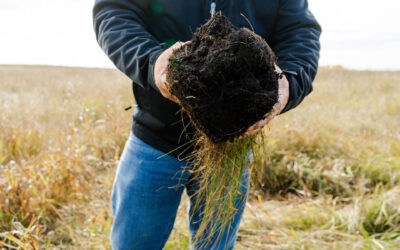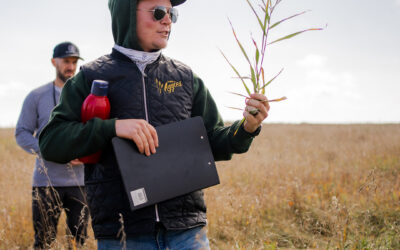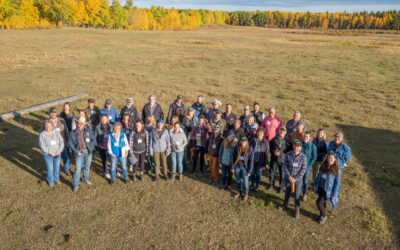Regenerative Agricultural Practices
Growing Roots is a regenerative agriculture program focused on soil health launched in 2022 by ALUS with support from General Mills. With this program, ALUS continues to experiment with on-field project offerings, exploring how modified farming practices can produce ecosystem services and enhance biodiversity on agricultural lands and beyond.
The goal of this program is to deliver on-field regenerative agriculture programming using the ALUS model. A key aim of the program is to introduce farmers and ranchers to the principles of regenerative agriculture. Participants are invited to establish on-field projects that benefit soil health with financial support and technical guidance from coaches and an advisory committee composed of producers experienced in the implementation of regenerative practices.
Along with the deployment of projects rooted in regenerative principles, the program focuses on the facilitation of information transfer and knowledge exchange between program participants, ALUS PACs, coaches and the advisory committee. Growing Roots promotes peer-to-peer learning and the development of local, interactive networks of producers interested in implementing regenerative practices and principles on their land.
Taking part in the program are the communities of ALUS Assiniboine West, ALUS Saskatchewan Assiniboine Project and ALUS Seine Rat Roseau. For more information, contact your local ALUS Coordinator or ALUS Prairies Hub Manager, Paige Englot, at [email protected].
6 Core Principles of Regenerative Agricultural Practices
Understand Context
No two farms or ranches are the same, and the regenerative agriculture principles should be implemented based on the environmental, economic and cultural context of each unique operation.
Minimize soil disturbance
Soil is very porous, like a sponge, and tilling soil weakens its structure. It collapses on itself, hardens, and over time loses its ability to absorb water or allow roots to grow. Reducing or eliminating tillage, along with limiting other disturbances like overgrazing and over-application of nutrients and pesticides, can reverse this process.
Maximize plant diversity
Many problems that farmers and ranchers have to deal with – such as pests, diseases and poor nutrient cycling – can be traced to a lack of diversity in the agricultural system. Including a broader range of plants and animals in the system decreases pest and disease pressure, while also supporting biodiversity and improving the health of the soil.
Keep the soil covered
Keeping the soil covered with living plants and crop residue protects it from wind, sun, hard rain, and other elements that erode it and damage the organisms living in the soil.
Maintain living roots year-round
Green, living plants are the foundation of the soil ecosystem. While most crops only grow for a few months out of the year, growing plants continually throughout the year retains nutrients and increases the supply of food to the living things in the soil, which leads to carbon sequestration, cleaner water and improved soil function.
Integrate livestock
Integrating grazing livestock on crop land benefits plants and soil in numerous ways. Natural pruning inspires new plant growth, natural fertilizer invites helpful insects to aerate the soil and spread organic matter, and livestock movement increases nutrient cycling by trampling crop residue.understand that every farmer approaches his/her operation differently to account for unique characteristics and challenges, be it climate, soil type, topography, crop history, markets, labor, or equipment.
Growing Roots at a Glance

participants enrolled
acres targeted
projects proposed
USD Invested
Regenerative Agriculture Stories
Farmer Engagement Drives Success of Regenerative Agriculture Pilot
ALUS and General Mills expand community-led regenerative agriculture partnership after successful pilot.A Growing Roots participant shows the density of root structures at their project site. Dense root systems support soil health, water retention and can benefit...
Zack Koscielny on Creating Rural Resilience on the Prairies
A new generation of farmers finding community and peer-to-peer support through regenerative farming with ALUS Zack Koscielny on Green Beach Farm and Food at the Prairie Hub field conference. Zack and his family live near Strathclair, Manitoba, and together they...
Celebrating Success and Growing Collaboration at ALUS Field Conferences
ALUS team members met at three field events across Canada to share successes and celebrate their shared work. East Hub Field Conference In September, ALUS team members working in Ontario and Quebec made their way to Sarnia for the 2023 East Hub Field Conference. The...
Our Partner




